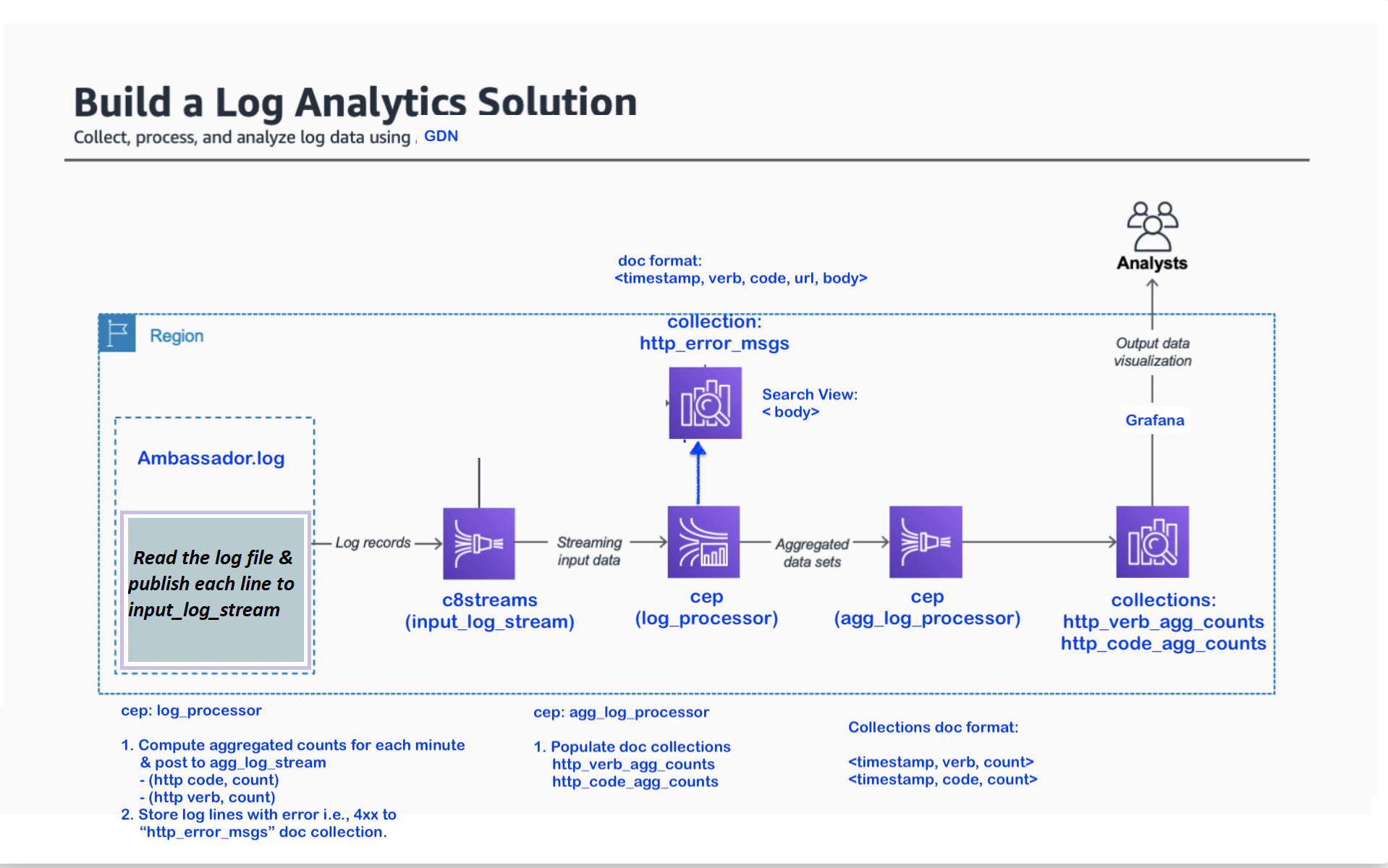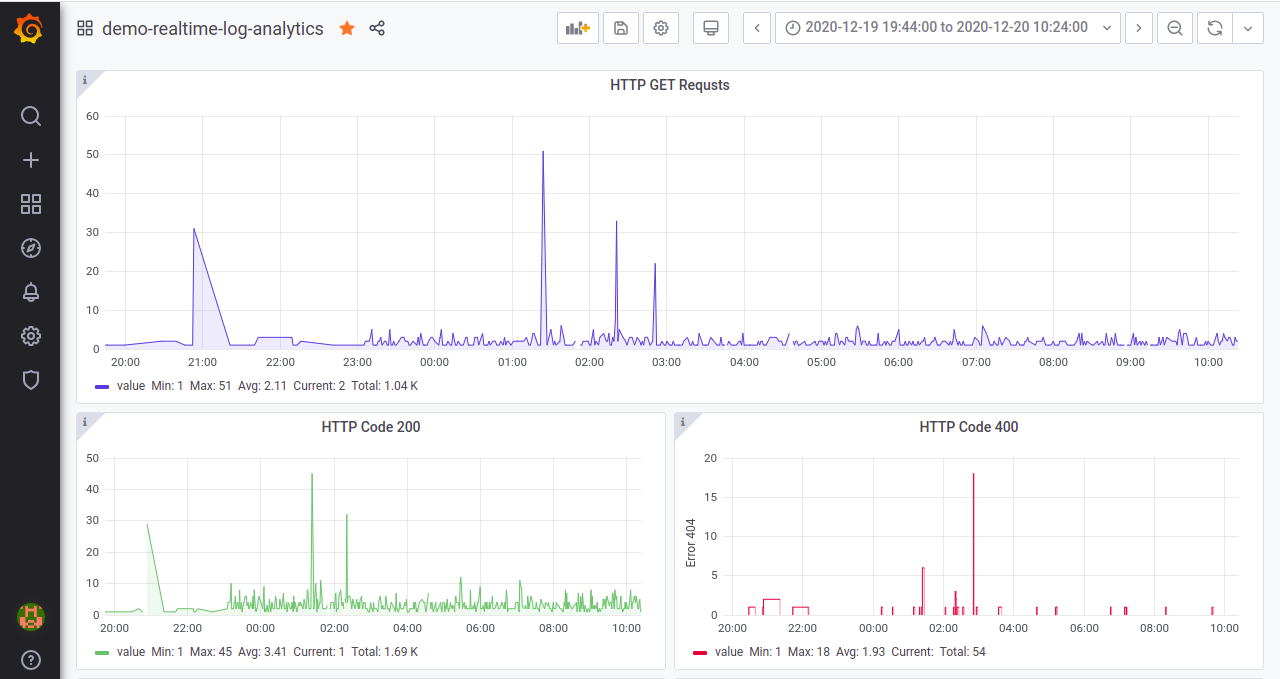Realtime Log Analytics using GDN
Building real-time log analytics solution using GDN
Setup
| Federation | Passsword | |
|---|---|---|
| Global Data Network | demo@macrometa.io | xxxxxxxx |
| Log File | -- | -- |
| Log Publisher | -- | -- |
| Analytics Dashboard | -- | -- |
How To Run:
On Federation:
Create and publish following Stream Workers in your federation: 1. log_processor 2. agg_code_processor 3. agg_verb_processor Following collections are created automatically: 1. http_verb_agg_count (doc collection) 2. http_code_agg_count (doc collection) 3. http_error_msgs (doc collection) Note: If you have run this tutorial before, you may want to truncate the collections.
On Development Machine:
git clone https://github.com/Macrometacorp/tutorial-log-analytics.git cd tutorial-log-analytics git fetch git checkout gh-pages npm install browserify producer.js > bundle.js //required if you make any changes in the producer.js #Open index.html in browser. #Enter your federation details and click on Publish button. #The logs will be published on `c8locals.input_log_stream`. The aggreation collections will be populated.
Stream Workers
log_processor:
@App:name("log_processor")
@App:description("Process error logs")
-- Read the incoming log and extract verb, code, url, timestamp, body
define function parseLog[javascript] return string {
var log = data[0];
var key = data[1];
const regex = /"[^"]+"|[^\s]+/g;
const splittedLine = log.match(regex).map(e => e.replace(/"(.+)"/, "$1"));
let [ipAddress, , , dateStr, seconds, headers, httpCode, , , body] = splittedLine;
const [httpVerb, url] = headers.split(" ");
// -- Round of the seconds Ex. 11/Feb/2020:13:55:23 +0100 to 11/Feb/2020:13:55:00
const timeStamp = dateStr.slice(1,-1).substr(0, dateStr.length-4)+":00";
let response;
if(key=='verb'){
response = httpVerb.trim();
}else if(key=='code'){
response = httpCode;
}else if(key=='url'){
response = url;
}else if(key=='timestamp'){
response = timeStamp;
}else if(key=='body'){
response = body;
}
return response;
};
@info("Read logs from input_log_stream stream")
@source(type="c8streams", stream.list="input_log_stream", replication.type="local", @map(type='json'))
define stream input_log_stream(log string);
@info("Read logs from input_log_stream stream and publish them to the logger")
@sink(type="logger", priority='INFO')
define stream input_logger_stream(log string);
@info("Store the error logs in http_error_msgs table")
@store(type="c8db", collection="http_error_msgs", replication.type="global", @map(type='json'))
define table http_error_msgs(timestamp string, verb string, code int, url string, body string);
@info("Publish the log data on http_intermediate_agg_counts for further processing")
@sink(type='c8streams', stream='http_intermediate_agg_counts', replication.type="local", @map(type='json'))
define stream http_intermediate_agg_counts(timestamp string, verb string, code int, url string);
select log from input_log_stream
insert into input_logger_stream;
@info("Store the error logs into http_error_msgs collection")
SELECT
parseLog(log, "timestamp") as timestamp,
parseLog(log, 'verb') as verb,
convert(parseLog(log, 'code'), 'int') as code,
parseLog(log, 'url') as url,
parseLog(log, 'body') as body
FROM input_log_stream[
(convert(parseLog(log,'code'), 'int') >= 400)
and (convert(parseLog(log, 'code'), 'int') <= 599)
and false==str:equalsIgnoreCase(parseLog(log, 'verb'), "EOF")
]
INSERT into http_error_msgs;
@info("Publish the log data on http_intermediate_agg_counts stream for further processing")
SELECT
parseLog(log, 'timestamp') as timestamp,
parseLog(log, 'verb') as verb,
convert(parseLog(log, 'code'), 'int') as code,
parseLog(log, 'url') as url
FROM input_log_stream
INSERT into http_intermediate_agg_counts;
agg_code_processor:
@App:name("agg_code_processor")
@App:description("Process aggregated code counts")
-- Populate and update the code-counter map. Increment counter value for the current verb
define function updateCache[javascript] return string {
var code = data[0].toString();
var cachedValue = data[1];
let map = JSON.parse(cachedValue);
typeof map[code] == 'undefined' ? map[code] = 1 : map[code]++;
return JSON.stringify(map);
};
-- Convert the record into JSON
define function toJson[javascript] return object {
const cache = data[0];
let json = JSON.parse(cache);
const timestamp = new Date(data[1].replace(':',' ')).getTime() ;
json.timestamp = timestamp;
return json;
};
-- Collection does not support key having special caracter like / and :
-- Replace such characters with _ (underscore)
define function getKey[javascript] return string {
return data[0].replace(/\//g,"_").replace(/:/g,"_");
};
@store(type='c8db', collection='http_code_agg_counts', replication.type="global", @map(type='json'))
define table http_code_agg_counts(log object);
@source(type='c8streams', stream.list='http_intermediate_agg_counts', replication.type="local", @map(type='json'))
define stream http_intermediate_agg_counts(timestamp string, verb string, code int, url string);
@store(type='c8streams', collection='put_in_cache', replication.type="local", @map(type='json'))
define stream put_in_cache(isVerbPut bool, isTimestampPut bool, oldData bool);
-- Maintain timestamp from the log in the cache
select
ifThenElse(cache:get(getKey(timestamp), "") == "",
cache:put(getKey(timestamp),updateCache(code, "{}")),
cache:put(getKey(timestamp),updateCache(code, cache:get(getKey(timestamp))))
) as isVerbPut,
false as isTimestampPut,
false as oldData
from http_intermediate_agg_counts
insert into put_in_cache;
-- When a log with new minute arrives
-- Get the old timestamp value
-- And the previously aggregated cached data for that timestamp
-- Insert that into the collection.
-- Skip insert if previously aggregated cached data is not available. i.e., 1st log from the file
select
toJson(cache:get("old_timestamp_data", ""), cache:get("old_timestamp", "")) as log
from http_intermediate_agg_counts[
false==str:equalsIgnoreCase(getKey(cache:get("old_timestamp_key", "")), getKey(timestamp))
and false==str:equalsIgnoreCase(cache:get("old_timestamp_data", "") ,"")
]
INSERT into http_code_agg_counts;
-- Update the cache with
-- old_timestamp_key Ex. `11_Feb_2020_13_56_00`
-- old_timestamp Ex. `11/Feb/2020:13:56:00`
-- old_timestamp_data Ex. `{'map': { '200': 3, '400': 1, '401': 1, '505': 1 }}`
select
cache:put("old_timestamp_key", getKey(timestamp)) as isVerbPut,
cache:put("old_timestamp", timestamp) as isTimestampPut,
cache:put("old_timestamp_data", cache:get(getKey(timestamp))) as oldData
from http_intermediate_agg_counts[
false==str:equalsIgnoreCase(verb, "EOF")
]
insert into put_in_cache;
-- Once file has been processed, it is required to purge the cache
-- The JS client app will send a dummy log with `EOF` text in the verb field
select
cache:purge() as isVerbPut,
false as isTimestampPut,
false as oldData
from http_intermediate_agg_counts[
str:equalsIgnoreCase(verb, "EOF")
]
insert into put_in_cache;
agg_verb_processor:
@App:name("agg_verb_processor")
@App:description("Process aggregated verb counts")
-- Populate and update the verb-counter map. Increment counter value by 1 for the current verb.
define function updateCache[javascript] return string {
var verb = data[0];
var cachedValue = data[1];
let map = JSON.parse(cachedValue);
typeof map[verb] == 'undefined' ? map[verb] = 1 : map[verb]++;
return JSON.stringify(map);
};
-- Convert the record into JSON
define function toJson[javascript] return object {
const cache = data[0];
let json = JSON.parse(cache);
const timestamp = new Date(data[1].replace(':',' ')).getTime() ;
json.timestamp = timestamp;
return json;
};
-- Collection does not support key having special caracter like / and :
-- Replace such characters with _ (underscore)
define function getKey[javascript] return string {
return data[0].replace(/\//g,"_").replace(/:/g,"_");
};
@source(type='c8streams', stream.list='http_intermediate_agg_counts', replication.type="local", @map(type='json'))
define stream http_intermediate_agg_counts(timestamp string, verb string, code int, url string);
@store(type='c8db', collection='http_verb_agg_counts', replication.type="global", @map(type='json'))
define table http_verb_agg_counts(log object);
@store(type='c8streams', collection='put_in_cache', replication.type="local", @map(type='json'))
define stream put_in_cache(isVerbPut bool, isTimestampPut bool,oldData bool);
-- Maintain timestamp from the log in the cache
select
ifThenElse(cache:get(getKey(timestamp),"") == "",
cache:put(getKey(timestamp),updateCache(verb,"{}")),
cache:put(getKey(timestamp),updateCache(verb,cache:get(getKey(timestamp))))) as isVerbPut,
false as isTimestampPut,
false as oldData
from http_intermediate_agg_counts
insert into put_in_cache;
-- When a log with new minute arrives
-- Get the old timestamp value
-- And the previously aggregated cached data for that timestamp
-- Insert that into the collection.
-- Skip insert if previously aggregated cached data is not available. i.e., 1st log from the file
select
toJson(cache:get("old_timestamp_data",""), cache:get("old_timestamp","")) as log
from http_intermediate_agg_counts[false==str:equalsIgnoreCase(cache:get("old_timestamp_data",""),"")
and false==str:equalsIgnoreCase(getKey(cache:get("old_timestamp_key","")), getKey(timestamp))]
INSERT into http_verb_agg_counts;
-- Update the cache with
-- old_timestamp_key Ex. `11_Feb_2020_13_56_00`
-- old_timestamp Ex. `11/Feb/2020:13:56:00`
-- old_timestamp_data Ex. `{'map': { '200': 3, '400': 1, '401': 1, '505': 1 }}`
select
cache:put("old_timestamp_key",getKey(timestamp)) as isVerbPut,
cache:put("old_timestamp",timestamp) as isTimestampPut,
cache:put("old_timestamp_data",cache:get(getKey(timestamp))) as oldData
from http_intermediate_agg_counts[false==str:equalsIgnoreCase(verb,"EOF")]
insert into put_in_cache;
-- Once file has been processed, it is required to purge the cache
-- The JS client app will send a dummy log with `EOF` text in the verb field
select
cache:purge() as isVerbPut,
false as isTimestampPut,
false as oldData
from http_intermediate_agg_counts[str:equalsIgnoreCase(verb,"EOF")]
insert into put_in_cache;
Collections
- http_verb_agg_count (doc collection)
- http_code_agg_count (doc collection)
- http_error_msgs (doc collection)
Search
Create a View called c8search_view_http_error_msgs with below JSON object.
It will apply search on body field of http_error_msgs collection.
{
"links": {
"http_error_msgs": {
"analyzers": [
"identity"
],
"fields": {
"body": {
"analyzers": []
}
},
"includeAllFields": true,
"storeValues": "none",
"trackListPositions": false
}
},
"primarySort": []
}On the above view lets execute below query to search and fetch all the documents those mention Safari in the body field.
FOR doc in c8search_view_http_error_msgs
SEARCH ANALYZER(doc.body IN TOKENS('Safari', 'text_en'), 'text_en')
SORT BM25(doc) desc
RETURN docVisualization
Please refer below 'c8-grafana-plugin' for visualization.
https://github.com/Macrometacorp/c8-grafana-plugin
Developer Notes
index.htmlrenders the UI of https://macrometacorp.github.io/demo-realtime-log-analytics . The page refers tobundle.jsscript.bundle.jsis bundled version ofproducer.jsand all of its dependencies.- Each time you update the
producer.jsyou need to rebuild thebundle.jsfile. - Use below command to do the same. Also make sure you chekin
bundle.jsalong withproducer.js
browserify producer.js > bundle.js

